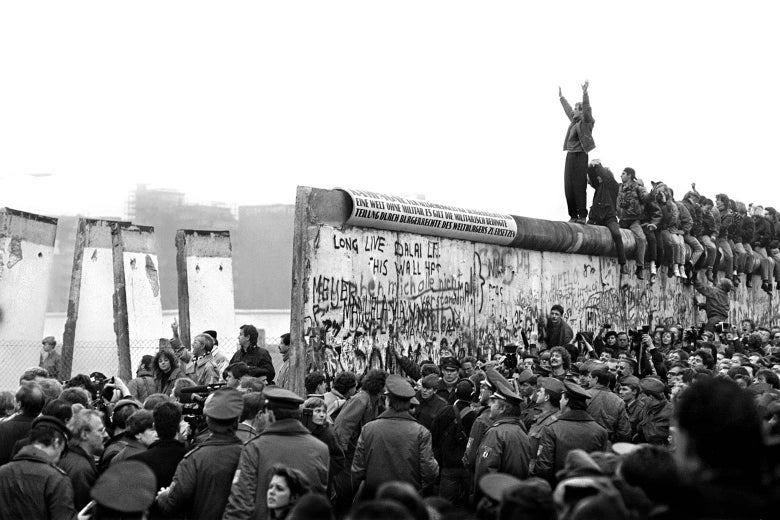In today’s world, it’s hard to fathom the delirious optimism of 1989.

People gather near a part of the Berlin Wall that had been broken down after the communist German Democratic Republic’s decision to open borders between East and West Berlin circa November 1989.
Carol Guzy/The Washington Post via Getty Images
One Sunday afternoon 30 years ago, as a Boston Globe reporter, I strolled through the rubble of what had just days earlier been the Berlin Wall, wondering what the world would look like a few decades hence: how the euphoria all around me—the liberation of a newly mended city, a nation, and soon (it seemed inevitable, even then) an entire bloc of the world—would play out.
Now here we are, about to commemorate the diamond anniversary of Nov. 9, 1989, the day the wall came crashing down and the people of East and West Berlin drank and danced in the streets, together for the first time in nearly three decades, celebrating the new dawn—and, well, things didn’t play out as joyfully as we all hoped.
Those who don’t remember that time have a view of Europe shaped by the fractious rancor of Brexit, doubts about NATO, strife over refugees, and the rise of neo-Nazi parties. But back then, the optimism in the air was palpable, even a bit delirious. Serious scholars heralded “the end of history”—the idea that Western-style markets, freedom, and democracy had prevailed against Soviet oppression and dictatorship not merely in the 40-year-long chess game called the Cold War but also in the dialectic struggle of history writ large. The victory marked an endpoint—or an end zone—of humanity’s sociopolitical evolution, and the future was ours.
The next few years saw the kernels of vindication. The Soviet Union itself soon imploded, and democratic movements took power—unseating Moscow’s stooges, for the most part nonviolently—across the once-oppressed capitals of Eastern Europe.
But the “holiday from history,” as some called this brief era, didn’t last long. Gradually, several of Eastern Europe’s new democracies—even the bright lights of Hungary and Poland—reverted to oppression and autocracy.
With the end of the Cold War, the superpowers loosened or lost their grip on their client states as well, and in the ensuing decades, this helped inspire the Arab Spring, with masses teeming and tyrants tumbling in Tunisia, Egypt, and, it seemed for a while, beyond. But, with few exceptions (Tunisia being one), this fire burned out more quickly still. Within a mere few years, in most of the Arab countries, the dictators—old or new—held tight to power, often brutally.
It was tempting to believe, in 1989, that the tumbling of a barrier and the crumbling of its guardian empire would unleash liberty and democracy, like the geyser of a pent-up volcano. But in fact, this view ignored the real nature of history. The Cold War had frozen the sociopolitical forces that long animated much of the world. When the Cold War ended, those forces were unfrozen, and their fossils were reanimated. Countries like Czechoslovakia with some legacies of markets and democracy were able to revive the practices, in some cases with help from the West; those without such legacies—like Hungary and Romania—were not. And those such as Poland and the eastern part of Germany, with recent histories of both democracy and dictatorship, were left with tensions and struggles between those tendencies, which continue. How could it be otherwise?
“History walks on two feet,” Karl Marx wrote in one of his least Marxist pronouncements. It’s the sum total of a zillion different human actions and reactions—shaped, of course, by the politics, economics, and ecology of their times, but also capable of shaping or reshaping those external forces in transformative moments or over eons of time.
We all love a narrative with a beginning, a middle, and an ending—preferably a happy ending but, above all, some clearly demarcated final page with a lesson. The lesson of 1989 is that there is no grand march, no dialectic of thesis versus antithesis resolving in some synthesis, no moral arc bending toward justice—or toward any particular thing. History is an unending whirlwind, and we’re caught in it. Freedom and democracy are precious jewels. The annals of history show us they’re rarely achieved and hard to preserve. Amid the self-congratulations of our apparent Cold War victory, we all got complacent about what it takes to keep those jewels intact—to keep them from being tarnished or outright stolen by rogues and pseudo-populists—in Eastern Europe. We’re getting a taste now of how hard it is to keep the jewels safe even here at home.